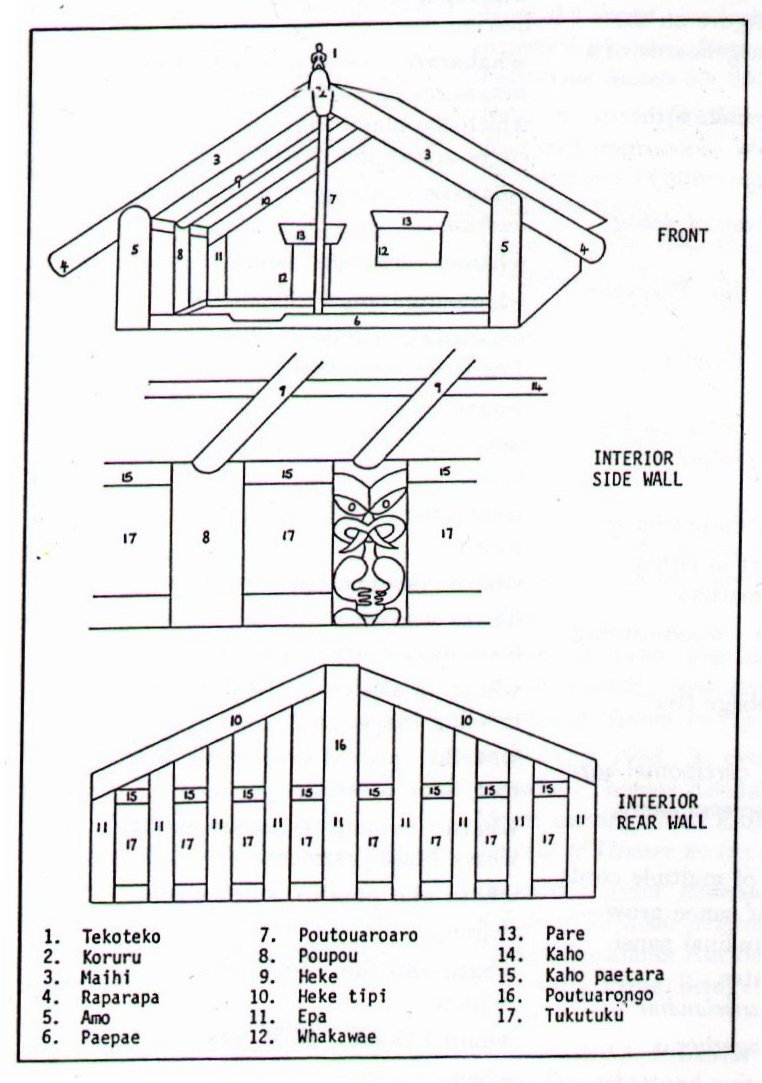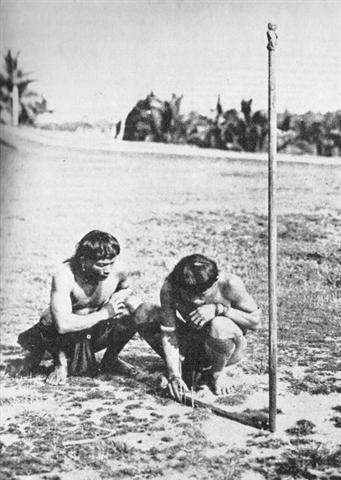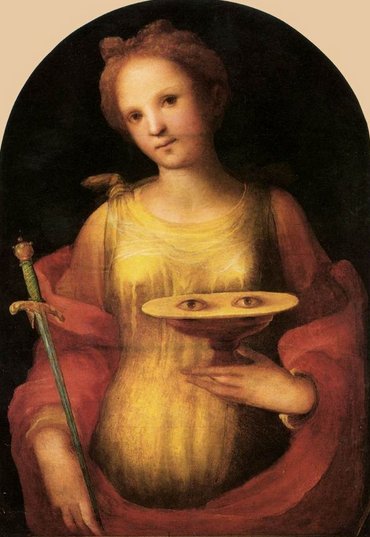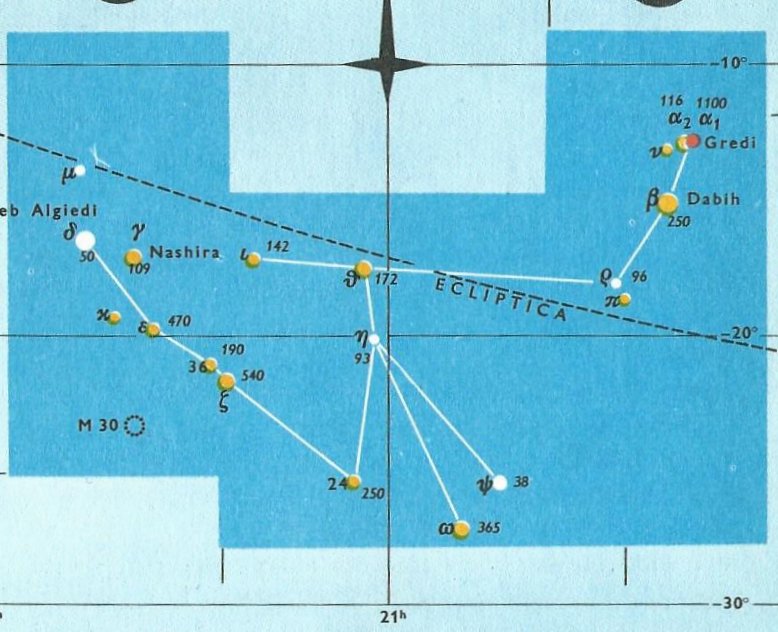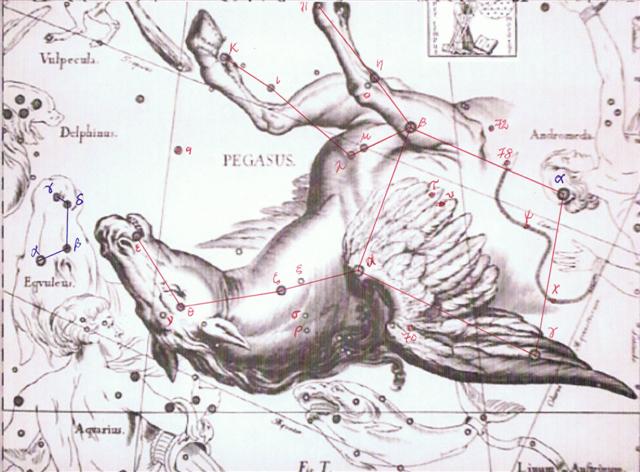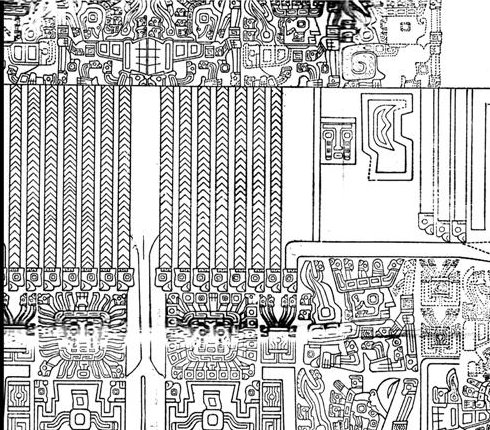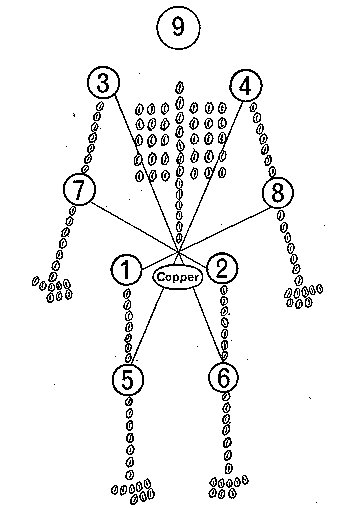The name Tuu maheke can be read as tuu-ma-heke, where heke (= 'octopus / rafter / migration') has a determinative function. Ma. (Prep.) for (found in some cases instead of mo). Vanaga. 1. And, with, in addition. P Pau.: ma, together with. Mgv.: ma, for, with. Mq.: ma, and. Ta.: ma, and, with. (... we may say of ma that it points to the non-ego and not-here and links it to the central concept of that which is active and present ... we should hold the consonantal value as carrying the linking, conjunctive, associative sense; the shade of variety in meaning would be found to exist as the nucleus of the e and of the o respectively - Churchill 2) 2. Shame; hakama, shame, confusion, timid, to blush, bashfulness. P Pau.: mataki, shame. Mgv.: akama, shame, bashfulness, modesty, shy. Mq.: maamaa, ninny, simpleton. Ta.: haama, timidity, shameful, confused. Churchill. Tuu.1. To stand erect. 2. Mast, pillar, post. Van Tilburg. 1. To stand erect, mast, pillar, post; tuu noa, perpendicular; tanu ki te tuu, to set a post; hakatu tuu, to step a mast; tuu hakamate tagata, gallows; hakatuu, to erect, to establish, to inactivate, to form, immobile, to set up, to raise. P Mgv., Mq., Ta.: tu, to stand up. 2. To exist, to be. Mgv.: tu, life, being, existence. 3. To accost, to hail; tuu mai te vaka, to hail the canoe. Mgv.: tu, a cry, a shout. 4. To rejoin; tuua to be reunited. 5. Hakatuu, example, mode, fashion, model, method, measure, to number. PS Sa.: tu, custom, habit. Fu.: tuu, to follow the example of. 6. Hakatuu, to disapprove; hakatuu riri, to conciliate, to appease wrath. 7. Hakatuu, to presage, prognostic, test. 8. Hakatuu, to taste. 9. Hakatuu, to mark, index, emblem, seal, sign, symbol, trace, vestige, aim; hakatuu ta, signature; akatuu, symptom; hakatuua, spot, mark; hakatuhaga, mark; hakatuutuu, demarcation. Churchill. 1. To arrive: tu'u-mai. 2. Upright pole; to stand upright (also: tutu'u). 3. To guess correctly, to work out (the meaning of a word) correctly: ku-tu'u-á koe ki te vânaga, you have guessed correctly [the meaning of] the word. 4. To hit the mark, to connect (a blow). 5. Ku-tu'u pehé, is considered as... ; te poki to'o i te me'e hakarere i roto i te hare, ku-tu'u-á pehé poki ra'ura'u, a child who takes things that have been left in the house is considered as a petty thief. Tu'u aro, northwest and west side of the island. Tu'u haígoígo, back tattoo. Tu'u haviki, easily angered person.Tu'u-toga, eel-fishing using a line weighted with stones and a hook with bait, so that the line reaches vertically straight to the bottom of the sea. Tu'utu'u, to hit the mark time and again. Tu'utu'u îka, fish fin (except the tail fin, called hiku). Vanaga. ... To the Polynesian and to the Melanesian has come no concept of bare existence; he sees no need to say of himself 'I am', always 'I am doing', 'I am suffering'. It is hard for the stranger of alien culture to relinquish his nude idea of existence and to adopt the island idea; it is far more difficult to acquire the feeling of the language and to accomplish elegance in the diction under these unfamiliar conditions. Take for an illustrative example these two sentences from the Viti: Sa tiko na tamata e kila: there are (sit) men who know. Sa tu mai vale na yau: the goods are (stand) in the house. The use of tu for tiko and of tiko for tu would not produce incomprehensibility, but it would entail a loss of finish in diction, it would stamp the speaker as vulgar, as a white man ... Savage life is far too complex; it is only in rich civilization that we can rise to the simplicity of elemental concepts ... Churchill 2. 8 legs characterize both the spider and the octopus, but the latter cannot stand erect. Thus the still immature (green) royal child Tuu-ma-heke could not wait, had no stamina, was crying instead of standing up like a true warrior man - which of course would have irritated king Hotu A Matua. ... A very detailed myth comes from the island of Nauru. In the beginning there was nothing but the sea, and above soared the Old-Spider. One day the Old-Spider found a giant clam, took it up, and tried to find if this object had any opening, but could find none. She tapped on it, and as it sounded hollow, she decided it was empty. By repeating a charm, she opened the two shells and slipped inside. She could see nothing, because the sun and the moon did not then exist; and then, she could not stand up because there was not enough room in the shellfish. Constantly hunting about she at last found a snail. To endow it with power she placed it under her arm, lay down and slept for three days. Then she let it free, and still hunting about she found another snail bigger than the first one, and treated it in the same way. Then she said to the first snail: 'Can you open this room a little, so that we can sit down?' The snail said it could, and opened the shell a little. Old-Spider then took the snail, placed it in the west of the shell, and made it into the moon. Then there was a little light, which allowed Old-Spider to see a big worm. At her request he opened the shell a little wider, and from the body of the worm flowed a salted sweat which collected in the lower half-shell and became the sea. Then he raised the upper half-shell very high, and it became the sky. Rigi, the worm, exhausted by this great effort, then died. Old-Spider then made the sun from the second snail, and placed it beside the lower half-shell, which became the earth. Larousse. Ta.: iki, iini, to pour, to spill. Sa.: ligi, liligi, id. Ma.: ringi, riringi, id. Ta.: ninii, id. Pau.: riringi, id. Churchill. ... Then three lines are drawn east and west, one across the northern section indicates the northern limit of the Sun (corresponding with the Tropic of Cancer) about the 15th and 16th days of the month Kaulua (i.e., the 21st or 22nd of June) and is called ke alanui polohiwa a Kane, the black-shining road of Kane. The line across the southern section indicates the southern limit of the Sun about the 15th or 16th days of the month Hilinama (December 22) and is called ke alanui polohiwa a Kanaloa, the black-shining road of Kanaloa. The line exactly around the middle of the sphere is called ke alanui a ke ku'uku'u, the road of the spider, and also ke alanui i ka Piko a Wakea, the way to the navel of Wakea (the Sky-father). Between these lines are the fixed stars of the various lands, na hokupaa a ka aina. (These are the stars which hang suspended in the zeniths of the Polynesian islands most of which lie within the tropics.) On the sides are the stars by which one navigates ... The Road of the Spider was the tropical belt, but Easter Island was further down and therefore the Sun would never stand erect, never be at the zenith (te tini). ... King Hotu arose [he ea.mai.te ariki.a Hotu] and went from his house to the front of the house of Tuu Maheke, which was a distance away [he oho.mai mai toona hare.ki mua ki te hare.o Tuu maheke] ... In New Zealand the distance away from the equator was even greater and they had therefore designed their meeting houses with rafters named after the octopus (heke).
The ceiling was divided in the middle by Pou-tua-Rongo (Pillar at the back side - Rongo), above the central Epa. Epa. To extend horizontally [Sic!], to jut out. Vanaga. Tua. 1. Back, shoulder, tu'a ivi, shoulder blade; tu'a ivi more, lumbago; moa tu'a ivi raá, 'sun-back chicken': chicken with a yellow back which shines in the sun. 2. Behind (a locative adverb, used with i, ki, a, o, etc). Tu'a-papa, pelvis, hips. Vanaga. 1. Behind, back, rear; ki tua, after; o tua, younger; taki tua, perineum. 2. Sea urchin, echinus. The word must have a germ sense indicating something spinous which will be satisfactorily descriptive of the sea urchin all spines, the prawn with antennae and thin long legs, and in the Maori the shell of Mesodesma spissa. Tuaapapa, haunch, hip, spine. Tuahaigoigo, tattooing on the back. Tuahuri, abortion; poki tuahuri, abortive child. Tuaivi, spine, vertebræ, back, loins; mate mai te tuaivi, ill at ease. Tuakana, elder, elder brother; tuakana tamaahina, elder sister. Tuamouga, mountain summit. Tuatua, to glean. Mgv. tua: To fell, to cut down. Ta.: tua, to cut. Mq.: tua, to fell, to cut down. Ma.: tua, id. Tuaki, to disembowel. Ma.: tuaki, to clean fish. Tuavera, the last breadfruit spoiled by the wind. Ta.: tuavera, burnt by the sun. Churchill. On the outside and in front the corresponding central position was that of Pou-tou-aroaro (Pillar of uprising - in front), below Tekoteko at the top. ... King Hotu arose [he ea.mai.te ariki.a Hotu] and went from his house to the front of the house of Tuu Maheke [ki mua ki te hare.o Tuu maheke] ... Ea, To rise, to get up. Ka ea ki táû rikiriki tâtou. Let's get up and play a little game of war. Vanaga. To go out, to bring out; ea ki aho, to send away; raa ea mai, the sun rises; ka ea, be off. Churchill. Tou. In ancient times, a tou was someone who had recovered from an epidemic, but whose illness meant that someone else in the family had to die. The tou were regarded as portents of evil. Toutou, lush; fertile (land). Toûa: Egg yolk; the colour yellow; soft, fibrous part of tree bark; toûa mahute, mahute fibres. Vanaga. Toua: Wrath, anger, rage, revenge, battle, combat, debate, dispute, dissension, uprising, revolt, quarrel, fight, hostility (taua); toua rae, to provoke, rae toua, to open hostilities, toua kakai, to rebuke, tuki toua, to stir up dissension; totoua, hostility; hakatoua, fighter, warrior. P Mgv.: toua, war, battle. Mq.: toua, war, dispute, quarrel. The form with o is found only in these three languages, taua is found in the general migration, Rapanui is the only speech which has both. Toutou, fertile (tautau); hakatoutou, to fertilize. Mq.: taútaú, fertile. Toùvae, to run; hakauruuru toùvae, id. Churchill. ... In the Hawaiian group, the western portion or side of an island was called 'the front', ke alo, of the land, and the eastern side was called 'the back', ke kua ... Teko. Giant (noun). Vanaga. Pau.: Tekoteko, vain, proud, conceited. Ta.: teóteó, haughty. Ha.: keo, proud. Churchill. Mq.: Tekoteko, white. Haw.: keo, id. Churchill.
The Weeping place was the last star position in the Capricorn, beyond its tail. Appropriately the Greek letter for the Chinese Kuh (Weeping) had been chosen as μ (denoting water), in contrast to the opposite character of η - in the center of the 'house'.
On the back of the South American stone statue representing Pacha-mama (the World Mother) the central line dividing her 14 tresses was an 'arrow' (teka): Teka. Tekai, curl, a round ball, as of twine. (Tekateka) hakatekateka, rudder, helm. Churchill. Routledge's informants still knew the names of the immigrant canoes (RM:278); they were given as 'Oteka' and 'Oua'. One Rongorongo text shows ua as the term used for two canoes, while RR:76 [Barthel's no. 76, GD111] (phallus grapheme ure, used in this case for an old synonym teka; compare TUA. teka 'penis of a turtle', HAW. ke'a 'virile male') tends to confirm the oral tradition with a transpositional variant (Barthel 1962:134). Barthel 2. Pau. teka, arrow. Ta.: tea, id. Mq.: teka, a game with darts. Sa.: te'a, id. Ma.: teka, id. Churchill. Mgv. teka, a support, scaffold. Ta.: tea, the horizontal balk of a palisade, the crossbeam of a house. Mq.: tekateka, across, athwart. Ha.: kea, a cross. Churchill. 65 - ono tekau ma rima illustrates how in the Maori dialect tekau stands for 10. Harawira.
But this arrow had been broken and its head was gone. ... The brutes of spring caused the downfall of both Captain Cook and Julius Caesar. We are close to the key myth of mankind, that which explains the regeneration and of growth. Once at least some people kept the tradition living. I became interested in what really happened in March 15 and reopened Henrikson to find out: Caesar was forewarned of the threat by the prophet Spurinna, who told him that a great threat was coming at Idus Martiae or just before. The day arrived and Caesar was still living, walking to his meeting with the Senate when he happened to encounter Spurinna and told him jokingly that he was still alive. Spurinna calmly answered that the day had yet not ended. The Romans divided their months in two parts and the dividing point was Idus, which in some way was connected with the full moon. March 15 was the midpoint of March, which is close to spring equinox. The old agricultural year defined the beginning of the year to the time when sun returned, and it was connected with Mars ... ... Tu'i Tofua was the son of Vakafuhu. His mother was Langitaetaea, but she was only one of the many young women whom Vakafuhu had living behind the fences of his dwelling. When Tu'i Tofua grew he was given the first-born sons of all the wives for his companions, and they all used to play sika outside the enclosure of Vakafuhu. They made their sika of clean-peeled sticks and threw them in turn along the ground, they glanced them off a mound and each one tried to make the longest throw. One day while Vakafuhu was sleeping off a kava-drinking those boys were playing their game outside, and Tu'i Tofua threw his sika. Then indeed the enormous strength of Tu'i Tofua made that sika fly over the fences into his father's place. It landed where the women were and they all began to giggle, those girls, and shriek and laugh. They did this because they wanted that handsome youth to come among them, they desired him. More than his father they desired him. They fell with joy upon the sika of their master's son, and snapped it. When he came inside to get it back they called out things that made him embarrased. 'Haven't you got another long thing there, Tu'i?' those women said. 'This one's broken.' And they put their hands across their faces and they laughed ...
... The basic myth of dynastic Egypt was that of the death and resurrection of Osiris, the good king, 'fair of face', who was born to the earth-god Geb and sky-goddess Nut. He was born together with his sister-wife, the goddess Isis, during the sacred interval of those five supplementary days that fell between one Egyptian calendric year of 360 days and the next. He and his sister were the first to plant wheat and barley, to gather fruit from trees, and to cultivate the vine, and before their time the races of the world had been savage cannibals. But Osiris's evil brother, Set, whose sister-wife was the goddess Nephtys, was mortally jealous both of his virtue and of his fame, and so, stealthily taking the measure of his good brother's body, he caused a beautifully decorated sarcophagus to be fashioned and on a certain occasion in the palace, when all were drinking and making merry, had it brought into the room and jestingly promised to give it to the one whom it should fit exactly. All tried, but, like the glass slipper of Cinderella, it fitted but one; and when Osiris, the last, laid himself within it, immediately a company of seventy-two conspirators [360 - 72 = 288] with whom Set had contrived his plot dashed forward, nailed the lid upon the sarcophagus, soldered it with molten lead, and flung it into the Nile, down which it floated to the sea. Isis, overwhelmed with grief, sheared off her locks, donned mourning, and searched in vain, up and down the Nile; but the coffin had been carried by the tide to the coast of Phoenicia, where, at Byblos, it was cast ashore. A tamarisk immediately grew up around it, enclosing the precious object in its trunk, and the aroma of this tree then was so glorious that the local king, and queen, Melqart and Astarte - who were, of course, a divine king and queen themselves, the local representatives, in fact, of the common mythology of Damuzi and Inanna, Tammuz and Ishtar, Adonis and Aphrodite, Osiris and Isis - discovering and admiring its beauty, had the tree felled and fashioned into a pillar of their palace. The bereaved and sorrowing Isis, meanwhile, wandering over the world in her quest - like Demeter in search of the lost Persephone - came to Byblos, where she learned of the wonderful tree. And, placing herself by a well of the city, in mourning, veiled and in humble guise - again like Demeter - she spoke to none until there approached the well the handmaidens of the queen, whom she greeted kindly. Braiding their hair, she breathed upon them such a wondrous perfume that when they returned and Astarte saw and smelt the braids she sent for the stranger, took her into the house, and made her the nurse of her child. The great goddess gave the infant her finger instead of breast to suck and at night, having placed him in a fire to burn away all that was mortal, flew in the form of a swallow around the pillar, mournfully chirping. But the child's mother, Queen Astarte, happening in upon this scene, shrieked when she spied her little son resting in the flames and thereby deprived him of the priceless boon. Whereupon Isis, revealing her true nature, begged for the pillar and, removing the sarcophagus, fell upon it with a cry of grief so loud that the queen's child died on the spot. Sorrowing, then, the two women placed Osiris's coffer on a boat, and when the goddess Isis was alone with it at sea, she opened the chest and, laying her face on the face of her brother, kissed him and wept. The myth goes on to tell of the blessed boat's arrival in the marshes of the Delta, and of how Set, one night hunting the boar by the light of the full moon, discovered the sarcophagus and tore the body into fourteen [392 / 28] pieces, which he scattered abroad; so that, once again, the goddess had a difficult task before her. She was assisted, this time, however, by her little son Horus, who had the head of a hawk, by the son of her sister Nephtys, little Anubis, who had the head of a jackal, and by Nephtys herself, the sister-bride of their wicked brother Set. Anubis, the elder of the two boys, had been conceived one very dark night, we are told, when Osiris mistook Nephtys for Isis; so that by some it is argued that the malice of Set must have been inspired not by the public virtue and good name of the noble culture hero, but by this domestic inadventure. The younger, but true son, Horus, on the other hand, had been more fortunately conceived - according to some, when Isis lay upon her dead brother in the boat, or, according to others, as she fluttered about the palace pillar in the form of a bird. The four bereaved and searching divinities, the two mothers and their two sons, were joined by a fifth, the moon-god Thoth (who appears sometimes in the form of an ibis-headed scribe, at other times in the form of a baboon), and together they found all of Osiris save his genital member, which had been swallowed by a fish ...
|
|||||||||||||||||||||||||||||||||||||||||||||||||||||||||||||||||||||||
